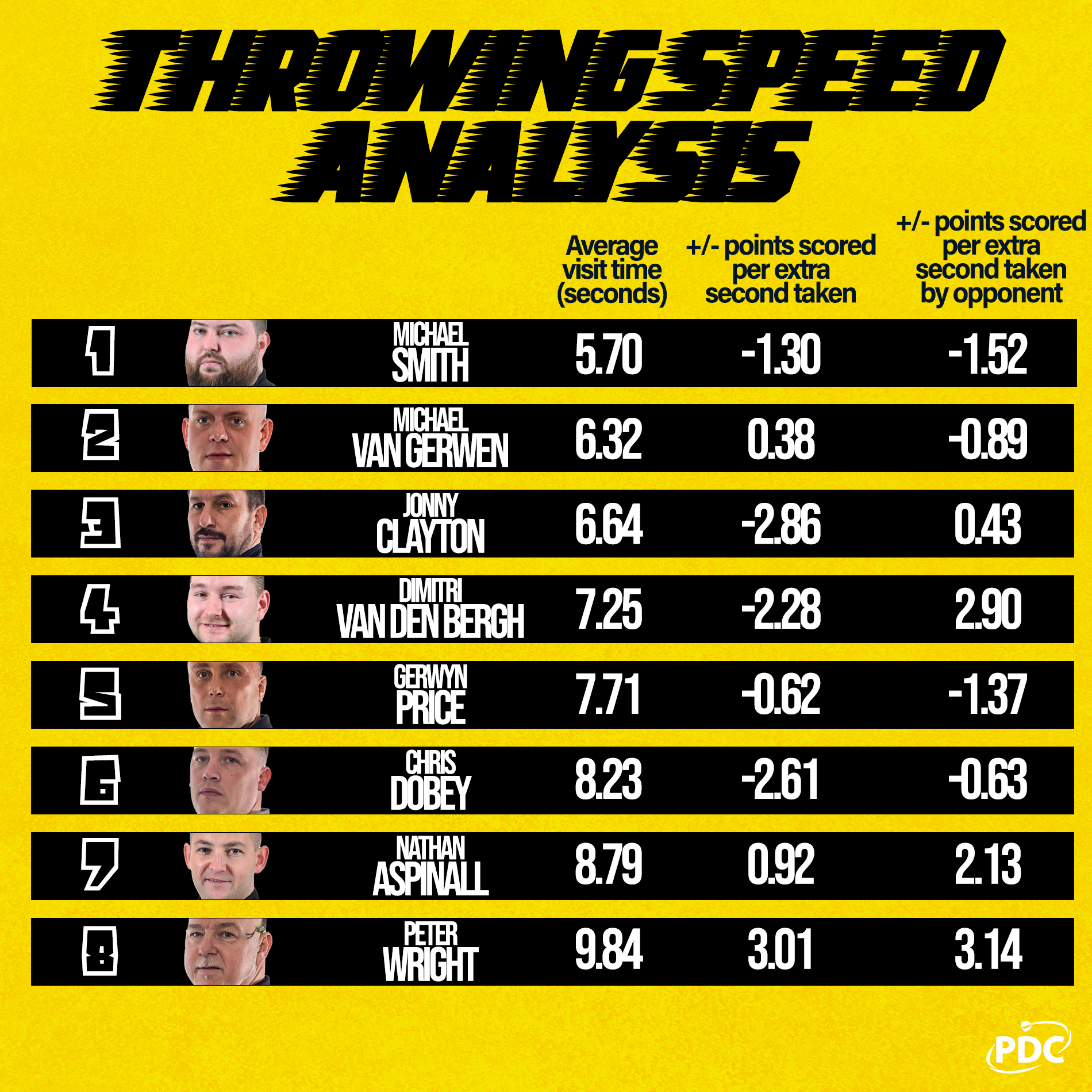
PDC stats analyst Christopher Kempf assesses the introduction of Sportradar's throwing time data and the effect of these timings on the performance of the Cazoo Premier League's stars.
The relationship between speed of play and performance is often discussed, but without hard evidence to support claims as to whether a certain player benefits or not from a faster pace of play, any debate has previously been open to conjecture.
It is equally plausible to suppose that the rhythm of rapid release and reloading of darts promotes higher accuracy and scoring, as to believe that more methodical aiming could have the same effect.
It could also be true that players' different techniques benefit differently from slower or quicker paces.
However, without watching thousands of darts fly through the air and clicking the button of a stopwatch after each one, no arguments can receive any evidentiary support.
Thanks to the efforts of Sportradar, the live-scoring provider for the PDC, we can make a first step toward understanding this important aspect of the game.

Each leg tracked by Sportradar receives an average time of visit as the darts are individually entered into its database after landing in the board, meaning that we can begin to put hard numbers to reckoning about which players throw faster or slower, as well as - more critically - the extent to which that speed is correlated with higher or lower averages.
The data recorded also produces an average time of all visits thrown in a given leg and match, although Sportradar's visit time data excludes the first visit of every leg - to account for any lag time between legs - and eliminates from consideration any visit in which fewer than three darts were thrown - in an attempt to standardize and improve the quality of the data - with the result that there now exists a comprehensive dataset allowing us to approximate the average length of time needed to complete a three-dart visit.
The amount of error in each data point is not known, but assuming it to be consistent in being recorded for all players, we now have a preliminary source for analysis of one of darts' most interesting questions.
Let us consider the eight players in the 2023 Cazoo Premier League in their campaign so far.
In general, there is a positive relationship between speed and scoring: for every additional second it takes for a Premier League player to complete his visit, his score in three-dart visits (excluding the first of the leg) decreases by 0.39 points on average.
But a model which used speed as the independent variable in attempting to explain the variation in darts scores would be a very poor one: at most 3% of the score variation in a simple linear model could be explained by differences in visit times.
For many players, there is no clear relationship between higher averages and any change in visit times. For example, there is almost zero correlation for Michael van Gerwen - only 2% of his improved scoring could be attributed to speed, and his accuracy actually declines slightly as he throws faster.
Interestingly, many of the players currently competing in the Premier League appear to show some speed preference.
For each additional second it takes Jonny Clayton to throw three darts, he scores 2.86 fewer points. For Chris Dobey, the decline is 2.61 points and for Dimitri Van den Bergh, it is 2.28.
Gerwyn Price and Michael Smith also show some preference for faster throwing - but for Peter Wright, the Premier League's slowest-throwing player at 9.84 seconds per visit, increased speed is correlated with lower scores; each additional second adds three points onto his per-visit total.
Faster or slower pace of play can also be promoted by a player's opponents: does Wright also play better when his opponents take longer to throw their darts?
The answer is yes: for every additional second of his opponents' visits, his scores improve by 3.14 points.
But there is not always a consistent relationship between the two correlations. Van den Bergh, as we have seen, subtracts 2.28 points from his averages for every additional second of throwing time, but adds 2.90 points for every additional second taken by his opponents.
Only Dobey, Price and Smith favour a faster pace of play regardless of whether it is instigated by their opponents or by themselves, while Aspinall and Wright benefit from slower matches.
Given the increase in metrics of match data in recent years, this is an exciting first step to integrating this critical variable in darts performance into our understanding of the sport.
Follow Christopher Kempf on Twitter through @Ochepedia.

